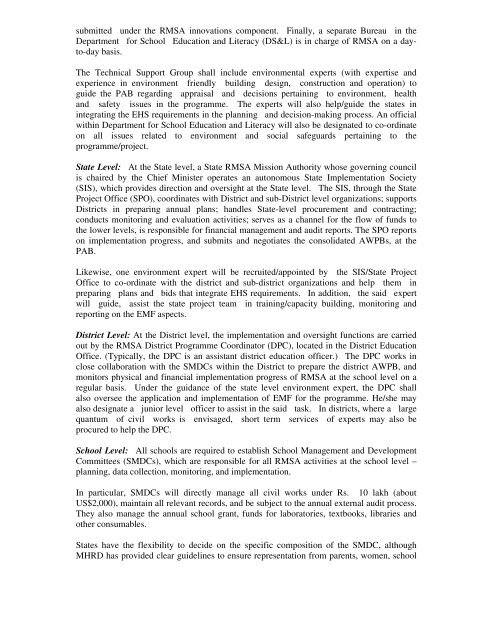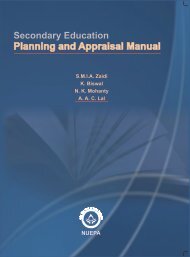Download File
Download File
Download File
Create successful ePaper yourself
Turn your PDF publications into a flip-book with our unique Google optimized e-Paper software.
submitted under the RMSA innovations component. Finally, a separate Bureau in the<br />
Department for School Education and Literacy (DS&L) is in charge of RMSA on a dayto-day<br />
basis.<br />
The Technical Support Group shall include environmental experts (with expertise and<br />
experience in environment friendly building design, construction and operation) to<br />
guide the PAB regarding appraisal and decisions pertaining to environment, health<br />
and safety issues in the programme. The experts will also help/guide the states in<br />
integrating the EHS requirements in the planning and decision-making process. An official<br />
within Department for School Education and Literacy will also be designated to co-ordinate<br />
on all issues related to environment and social safeguards pertaining to the<br />
programme/project.<br />
State Level: At the State level, a State RMSA Mission Authority whose governing council<br />
is chaired by the Chief Minister operates an autonomous State Implementation Society<br />
(SIS), which provides direction and oversight at the State level. The SIS, through the State<br />
Project Office (SPO), coordinates with District and sub-District level organizations; supports<br />
Districts in preparing annual plans; handles State-level procurement and contracting;<br />
conducts monitoring and evaluation activities; serves as a channel for the flow of funds to<br />
the lower levels, is responsible for financial management and audit reports. The SPO reports<br />
on implementation progress, and submits and negotiates the consolidated AWPBs, at the<br />
PAB.<br />
Likewise, one environment expert will be recruited/appointed by the SIS/State Project<br />
Office to co-ordinate with the district and sub-district organizations and help them in<br />
preparing plans and bids that integrate EHS requirements. In addition, the said expert<br />
will guide, assist the state project team in training/capacity building, monitoring and<br />
reporting on the EMF aspects.<br />
District Level: At the District level, the implementation and oversight functions are carried<br />
out by the RMSA District Programme Coordinator (DPC), located in the District Education<br />
Office. (Typically, the DPC is an assistant district education officer.) The DPC works in<br />
close collaboration with the SMDCs within the District to prepare the district AWPB, and<br />
monitors physical and financial implementation progress of RMSA at the school level on a<br />
regular basis. Under the guidance of the state level environment expert, the DPC shall<br />
also oversee the application and implementation of EMF for the programme. He/she may<br />
also designate a junior level officer to assist in the said task. In districts, where a large<br />
quantum of civil works is envisaged, short term services of experts may also be<br />
procured to help the DPC.<br />
School Level: All schools are required to establish School Management and Development<br />
Committees (SMDCs), which are responsible for all RMSA activities at the school level –<br />
planning, data collection, monitoring, and implementation.<br />
In particular, SMDCs will directly manage all civil works under Rs. 10 lakh (about<br />
US$2,000), maintain all relevant records, and be subject to the annual external audit process.<br />
They also manage the annual school grant, funds for laboratories, textbooks, libraries and<br />
other consumables.<br />
States have the flexibility to decide on the specific composition of the SMDC, although<br />
MHRD has provided clear guidelines to ensure representation from parents, women, school




